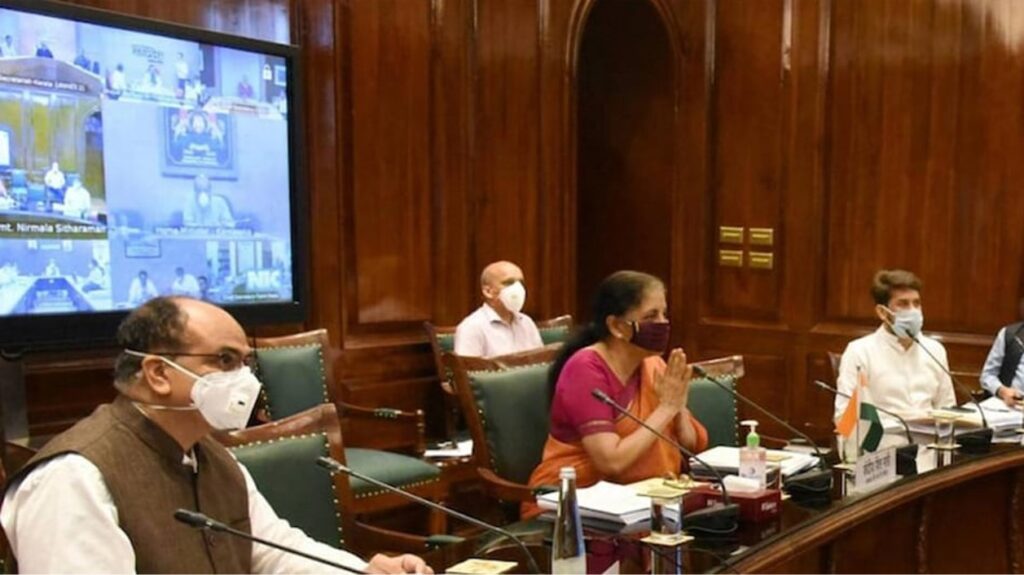Some important updates from the GST council meeting include a 5 per cent GST to be levied on deliveries by delivery apps and that no GST aid will be provided to States beyond 2022.
The council has given a go to the proposal made by Swiggy and Zomato regarding charging 5 per cent GST on deliveries and supplied made by them.
Post the GST Council Meeting, the Finance Minister stated that the delivery apps will now directly be collecting GST from the consumers instead of the restaurants like they used to.
There would be no extra tax burden on the end consumers who are already registered with the GST. However, the levy will plug tax evasion being done by unregistered restaurants.
The changes will be effective from January 1, 2022, to allow the operators to make changes to their portals in order to charge tax.
“E-commerce operators are being made liable to pay tax on following services provided through them : transport of passengers, by any type of motor vehicles through it (w.e.f. January 1, 2022), restaurant services provided through it with some exceptions (w.e.f. January 1, 2022),” a statement of the financial statement said in accordance to the decision made by the GST council.
“The decision to make food aggregators pay tax on supplies made by restaurants from January 1, 2022 seems to have been done based on empirical data of underreporting by restaurants, despite having collected tax on supplies of food to customers. The impact on the end consumer is expected to be neutral where the restaurant is a registered one. For those supplies from unregistered, there could be a 5 per cent GST going forward,” a partner of Deloitte India, Mahesh Jaising reportedly said to the source.
“The proposal could of this nature could typically be implemented in two manners. Option 1, the food aggregator would charge GST and restaurant would not charge GST. This would be similar to cab aggregators and under this option, the restaurant would need to have two separate invoicing system – one for supplies in the restaurant and the other, through aggregators. Option 2, could be that the restaurants continue to charge GST and the food aggregator be treated as a deemed supplier (and buyer). This would have the same impact of tax recovery from the food aggregator like in Option 1, with a variance being that credit would need to be claimed by the food aggregator,” Mahesh Jaising further added in his statement.
It was estimated that the average net tax loss due to the under reporting of deliveries to the exchequer is Rs 2,000 crore over the past two years. These delivery apps are currently registered as Tax Collected at Source (TCS). One of the major reasons why this was implemented was because of the lack of mandatory registration check by Swiggy/Zomato and there were many unregistered restaurants supplying through it.
The Buck Stops On GST Aid
In other updates from the GST Council meet, the government has remained firm on not extending GST aid to states beyond 2022 as the states now have no options to rely on a near comprehensive revision of GST rates and possible pick up in the economic growth to soften the looming revenue shock. The center made it clear that it can’t extend GST revenue compensation mechanism for them beyond five years through 2022.
The GST council decided to start two different groups of state finance ministers where one is to look at ‘rationalization’ of the rate structure and the other to deal with compliance and technology issues.
The council even extended the tax sops/waiver for many important Covid drugs by three months and also provided many tax reliefs for other life-saving drugs.
After the 45th meeting of Council, Union Finance Minister Nirmala Sitharaman said even for servicing the special minimal-cost loan facility extended to states for FY21-FY22 to bridge the huge shortfall in the compensation fund pool, the designated cesses levied on certain “luxury and demerit” goods like automobiles, cigarettes and paan masala would need to stay till the end of FY26.
The compensation requirements have been falling short of the cess proceeds since FY20, and the gap widened immensely in FY21 for the current financial year too, the shortfall of the cess fund is seen at a whopping Rs 1.59 lakh crore, despite the robust GST receipts in recent months.
Tamil Nadu finance minister PTR Palanivel Thiagarajan told the source that “What they (TN officials who attended the meeting in his absence) told me was the compensation issue has been deferred to the next meeting. Some options were presented and, obviously, people could not make an immediate decision on such a complex issue.” He added that the state would expect a detailed note from the Centre on the issue.
Kerala finance minister KN Balagopal said reportedly that the Council discussed the issue of extending compensation. “Revenue loss of States is a serious issue. We raised the issue in the meeting. A Group of Ministers will be formed to look into this issue,” he said.
Lower growth in state GST collections due to the absence of compensation could jeopardise state government’s capex plans in the medium term. State GST (SGST) accounted for two-fifths of the aggregate own tax revenues of the state governments in the last three fiscal years. The weighted average GST rate is around 11.5% at present, as against the revenue neutral rate of 15.5% estimated originally.
